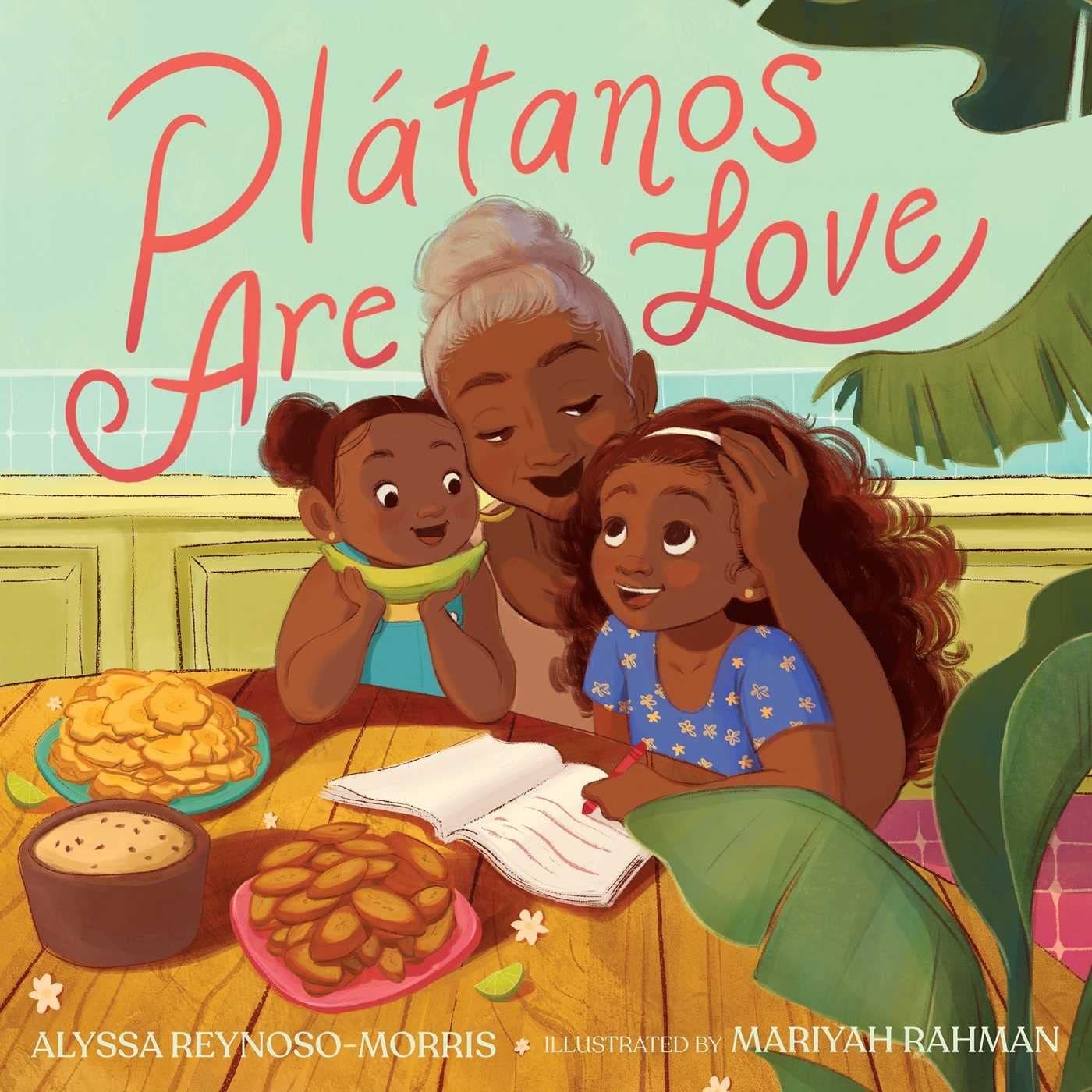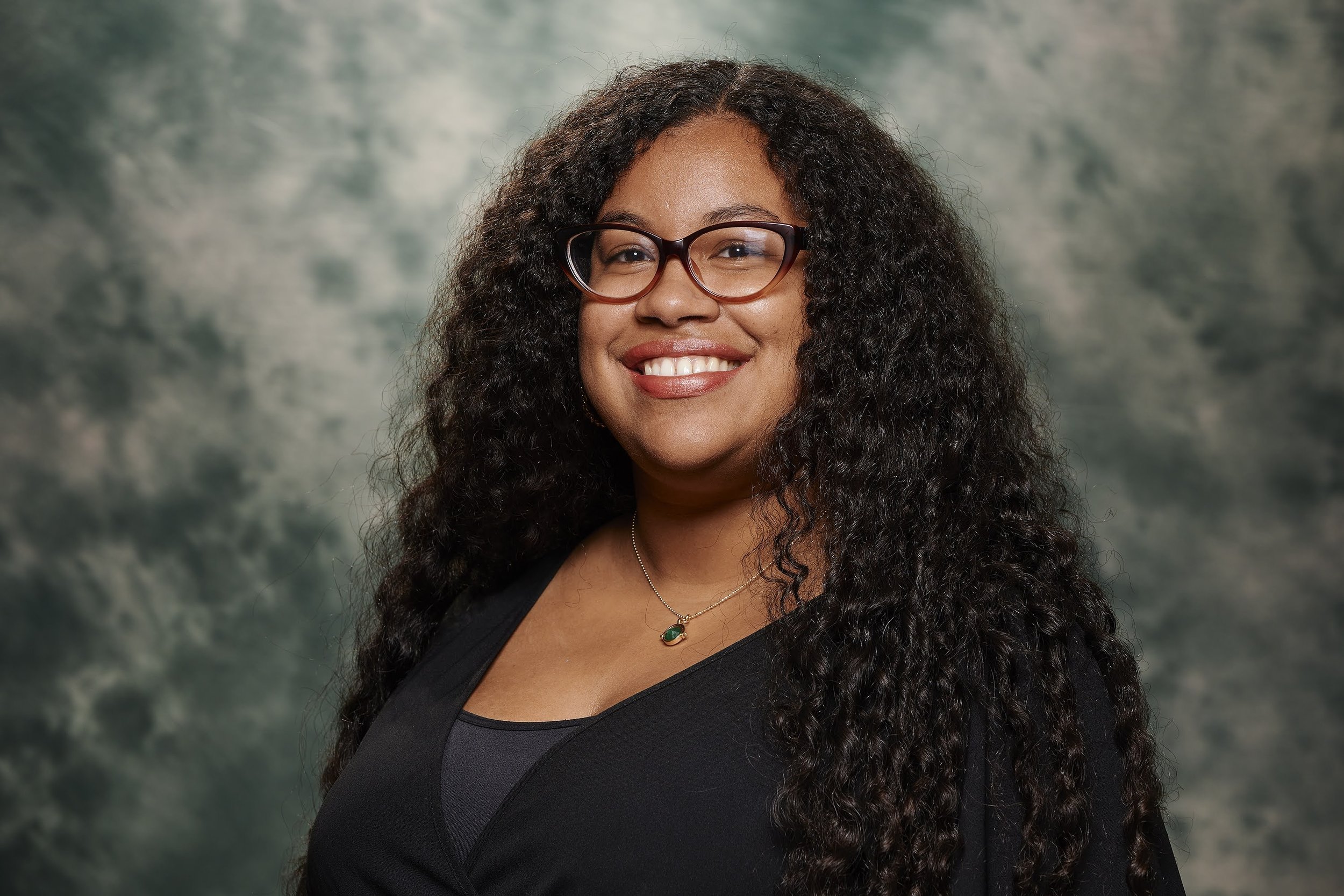I grew up eating platanos: mangú, tostones and maduros (or fritos as we like to call them in our household,) so you can imagine how excited I was when I learned of a children’s book dedicated to one of my first loves!
Plátanos Are Love by Alyssa Reynoso Morris is a beautiful homage to culture, history, traditions and family. The story starts with a young girl who goes produce shopping with her grandmother. This introduction sets the foundation for the journey in which the little girl takes the reader. As she learns from her grandmother how to cook plátanos, in a variety of ways, she also learns about the importance that they hold in her ancestral history. Ultimately, we find the young girl passing on the knowledge of what her grandmother has taught her, in the kitchen, to her little sister; giving us a full circle heartfelt moment.
The book is filled with wondrous attention to detail, starting with the beautiful bright illustrations by Mariyah Rahman. From the grandmothers hoop earrings, to the array of hairstyles on the characters, I felt seen. The Spanish interwoven throughout the story, welcomes us to a Spanglish filled world; one many of us can recognize. However, it’s the reader care that we see via a glossary, for those unfamiliar with the Spanish words, and the recipes for the wonderful dishes, mentioned throughout the book, that really brings the book together.
I had the opportunity to ask Alyssa Reynoso Morris a few questions about Plátanos Are Love. She spoke about the inspiration behind the book, the importance of knowing our history, what we can expect next from her and of course, how she prefers her plátanos.
““Plátanos Are Love” by Alyssa Reynoso Morris is a beautiful homage to culture, history, traditions and family. ”
Tiffany Gonzalez (TG): What or who inspired you to write this book?
Alyssa Reynoso Morris (ARM): I wanted to be a writer since I was 7 years old because I grew up with my Abuela—the original storyteller. She had a second-grade education, but that didn’t stop her from telling the best stories that captivated EVERYONE’S attention. I remember looking up to her and wanting to be like her. I think she knew that because she would rope me into “helping” her tell her stories. These are some of my fondest memories as well as the time we spent in the kitchen together. My love of my Abuela, her stories, and the food we made together inspired Plátanos Are Love.
TG: Immediately, I was drawn in by the Spanish words and loved the strong presence that "Spanglish" had throughout the book. It reminded me of my upbringing and of my day to day, in all honesty. Was that always the intention or did that come later on in the process of bringing this book together?
ARM: I love this question. The Spanglish was intentional. Growing up I spoke Spanish at home and English in school. Then as I got older my English proficiency outpaced my Spanish. I found myself speaking in Spanish and in Spanglish every chance I got to preserve the language. With time I learned to take pride in my Spanglish and my goal with my writing is for it to be as authentic as possible. When I started writing it I had sprinkled in Spanish and fortunately my editor asked me to lean into it more, so I did and I'm proud of what we created.
TG: The history of our ancestors played a very important role in the book. Can you speak on why this was important for you to highlight?
ARM: I'm a political science major and I'm obsessed with how our history affects our present. Growing up I learned about Trujillo and the Parsley Massacre but I didn't learn about slavery and colonization until I was in school. I think it's important for kids to learn where they come from. I think kids should know how resilient their ancestors were so they know they are also resilient and can do anything they set their mind to.
TG: It's essential for kids to see books that reflect their cultures; that reflect who they are. The one book I read as a child that highlighted Dominican culture has stayed with me till this day. Will you be continuing this work with future projects? Can we expect other aspects of Dominican/Puerto Rican culture or even just latinidad highlighted?
ARM: I love this question and the answer is YES you can expect more Latinidad to come in my future works. My Dominican and Puerto Rican culture and experiences are such huge parts of my identity and storytelling that I can't tell stories without incorporating it in. My second book The Bronx Is My Home is a love letter to the Bronx from the perspective of a Black Puertorican boy. There are references to Latiné heroes like Sonia Sotomayor and AOC. My third book is called Gloriana Presente: A First Day of School Book and it starts with Gloriana's Abuela soothes her first day of school nerves by telling her stories about their family home in la República Dominicana. Gloriana is uncertain about how to exist between her two homes, or how to make new friends between her two languages. This imaginative picture book celebrates the magic of existing in-between, and the transformative power of self-soothing to build confidence. I think immigrants and particularly the Latiné/x/o community will resonate with the text.
TG: Okay, if you had to choose one: tostones, maduros or mangú? And why?
ARM: Asking me to pick one is like asking me what my favorite book is. I just can't choose one because it really depends on my mood. When I want something sweet I go for maduros. When I want something crispy I go for tostones. Mangú is great when I want to feel full and am trying to be healthier as it's not fried. I also love mofongo, pastelon, and alcapurias but we needed to edit them out of the book because the manuscript was getting too long.
Alyssa Reynoso-Morris is a queer Afro-Latinx Dominican and Puerto Rican writer, wife, mother, and community organizer. During the day she is a chief of staff working with community members, nonprofit organizations, and government officials to make the world a better place. Then she puts her writer's hat on to craft heartfelt stories about home, family, food, and the fun places she has been. Alyssa was born and raised in the Bronx and currently lives in Philadelphia with her partner and daughter. Alyssa is honored to be a Musa with Las Musas Books which celebrates the diversity of voice, experience, and power of Latinx children's authors. She hopes you enjoy her stories. You can visit her website at alyssaauthor.com.
Mariyah Rahman was born and raised in Trinidad and Tobago. She spent her earliest years climbing trees, digging for fossils, and drawing on walls with crayons. Today she is an illustrator for children's books and entertainment but has still never found a fossil.
Tiffany Gonzalez is the Marketing Manager at Astra House and the Communications Co-Director for Latinx In Publishing. She previously worked in Production at HarperCollins Publishers. She has worked on the Publicity and Marketing campaign for Dreaming of You by Melissa Lozada-Oliva and on the Marketing campaigns for Becoming Abolitionists by Derecka Purnell, The Sex Lives of African Women by Nana Darkoa Sekiyamah and National Book Award Fiction Finalist The Town of Babylon by Alejandro Varela. She has earned her Bachelors and Master's degrees from Rutgers University - NB. She is Dominican-American and fluid in Spanish. She is a Publisher’s Weekly 2022 Star Watch Honoree. You can follow her on Instagram @wandering_tiff_ or visit her website at wanderingtiff.com











